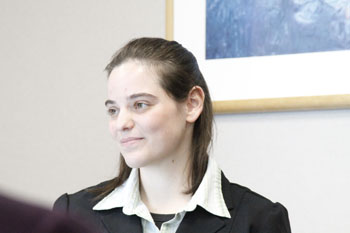Campus News
State Assemblymember Bill Monning meets with UCSC health sciences interns
Three UCSC human biology/health sciences program interns spoke in detail about their experiences during an informal meeting with state Assemblymember Bill Monning, chair of the Assembly Health Committee.



Human biology/health sciences is one of UCSC’s most popular and rigorous majors. Students must work and study hard, with a high level of direction and self-motivation.
But classroom experience can’t show them what it’s really like to be a doctor, a nurse, or a pharmacist.
To pick up this essential hands-on experience, all of the program’s students take part in a required internship program, which takes them into private practices, public hospitals, dentist’s offices, optometry offices, and “safety net” clinics, including Planned Parenthood.
Most of these internships take place in Santa Cruz County, and many of them place students in underserved communities.
Three students had a chance to talk in detail about these 100-hour, 10-week internships during an informal discussion on Tuesday at Sutter Maternity & Surgical Center of Santa Cruz with state Assemblymember Bill Monning, D-Carmel, chair of the State Assembly Health Committee.
The meeting was set up to spread awareness of UCSC’s groundbreaking and successful health sciences internship program, which will reach its 10-year anniversary next year. But participants also used the occasion to ask for Monning’s support for innovative programs that encourage students to consider primary care as a career goal.
Monica Santana, 21 (Oakes, ’12, health sciences), told Monning that the internship at Salud Para La Gente, a clinic in Watsonville, “opened my eyes to what life is like in the medical field.”
Raised in Watsonville, Santana remembers seeing large numbers of uninsured people in her hometown. She wanted to help them by becoming a family doctor in an underserved community. “I felt it was my calling,” she said.
The internship also helped her communicate more clearly with patients, assess their needs, and help them understand the importance and impact of their diagnoses.
Jodi Cerney, 21 (Merrill, ’13, health sciences/psychiatry), works as an intern at Pacific Coast Pediatric Care Center in Watsonville. The internship opened her eyes to the passion and commitment of medical providers and how important it is to care deeply about one’s patients, she said. “It’s very uplifting.”
During the Tuesday meeting, Dr. Lawrence deGhetaldi, CEO of Sutter Health’s Santa Cruz Area health care services, and a UCSC graduate, said that UCSC students tend to be socially conscious and more likely to consider a career in primary care.
But he expressed serious concern about the nationwide shortfall of primary care providers, and said the issue must be addressed with incentives for medical school students, including tuition remission for those interested in primary care.
“America must get back to the days when half of its medical school graduates chose primary care careers,” deGhetaldi said. Today, he said, the level has dropped to a mere 9 percent. DeGhetaldi said many medical students decide to be specialists in part because it’s more lucrative.
“We’ve got to fight specialty bias,” said Dr. Jeannine Rodems, a UCSC graduate who attended the discussion.
Rodems, who works in family practice at Cedar Medical Clinic in Santa Cruz, was referring to the fact that many medical students decide to become specialists because it’s often a more lucrative career path.
Monning applauded the health sciences students’ commitment and social consciousness, and their extensive training in Spanish. He noted that more than half of Monterey County’s residents speak Spanish as their primary language. In Santa Cruz County, the percentage is close to 25 percent.
While UCSC students have always been interested in health careers, these students did not have an organized, programmed way to extend their knowledge beyond the classroom until 2003, said Grant Hartzog, a professor of molecular, cell and developmental biology at UCSC, who provided an overview of the program for Monning.
That year, the university launched an internship program to support their interests. The programs – and the major – have grown exponentially over the years; there are now 500 students majoring in health sciences.
“If we cultivate students through the system, they are more likely to practice here (in the Santa Cruz County area) and address health care needs here,” Hartzog said.
All of the health sciences students are “nudged” toward considering primary care as a career goal, said Caroline Berger, who coordinates the internship program.
After the presentation, Monning agreed universities should encourage more students to enter primary care, especially during a time when technological advances can diminish the level of personal interaction between doctors and patients, and when primary care physicians are under pressure to shorten the lengths of visits.
He said that an increase in the number of primary care providers will be especially important in 2014, when 3.5 to 4 million Californians would become eligible for health care coverage under President Obama’s health care reform law, also known as the Affordable Care Act.
Two physicians—Jack Watson of Family Doctors of Santa Cruz and Dr. Jeanine Rodems, a UCSC graduate who works at Cedar Medical Clinic in Santa Cruz—also attended the informal discussion.